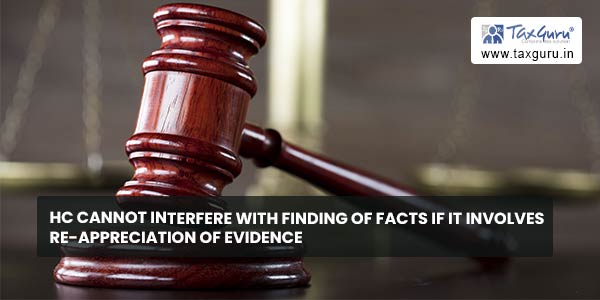Case Law Details
CIT (Exemptions) Vs Shugan Chandra Kothari Trust (Delhi High Court)
It is settled law that an appeal under Section 260A of the Act is to be entertained only when it directly and substantially affects the rights of the parties or is not free from difficulty or call for discussion of alternative views or the factual finding is perverse. It is further settled law that any interference with the finding of the fact is not warranted if it involves re-appreciation of evidence.
Since in the present instance, the factual findings of the ITAT are clear and cogent, the HC resent appeal being bereft of merits is dismissed.
FULL TEXT OF THE JUDGMENT/ORDER OF DELHI HIGH COURT
C.M.No.32806/2021
Keeping in view the averments in the application, the same is allowed and the delay in filing the present appeal is condoned. The appeal is taken on record.
Accordingly, the application stands disposed of.
ITA 146/2021
1. Present Appeal has been filed challenging the order dated 14th February, 2020 passed by Delhi Bench ‘A’ of Income Tax Appellate Tribunal in ITA No. 4982/Del/2019 for the Assessment Year 2014-15.
2. Learned counsel for the Appellant states that the ITAT has erred in overlooking the fact that the Assessing Officer had passed the original assessment order without making the required enquiry for verifying the claims made by the assessee, which had been described in detail by Commissioner of Income Tax (Exemptions) in the order dated 18th March, 2018, undoubtedly making the assessment order erroneous and also prejudicial to the interest of revenue, thus bringing the assessment order under the purview of Section 263 of the Income Tax Act, 1961 [for short ‘Act’].
3. Having perused the paper book, this Court finds that the ITAT in the impugned order has given detailed reasons as to why the exercise of jurisdiction by the Commissioner of Income Tax (Exemptions) under Section 263 of the Act was not warranted in the present case. The relevant portion of the said order is reproduced hereinbelow:-
“8. …….. As regards the cash deposit of Rs.6.05 crores in the Bank Account of assessee, the assessee produced complete details before A.O. …………… Rs.6.05 crores is the part of total receipts of assessee of Rs. 16.66 crores. The assessee received academic fees of Rs. 15.96 crores which includes the impugned amount. The assessee produced the complete list of the students who have made deposit directly with the Bank and the fees received by the School. Therefore, when the amount in question is included in total receipt of the assessee and have been assessed by the A.O, as such at original assessment stage after examining the same, there is no question of holding that it is an unaccounted income of the assessee or that A.O. failed to make enquiry on the same. The A.O. has verified all the facts after issuing query letter and considered the reply of the assessee and examination of details and books of accounts…..
8.2. ……….. The second issue is with regard to amount of two entries Rs.1.5 crores, which assessee has explained that Rs.1.56 crores was the amount received on sale of land through cheque, therefore, it could not be an undisclosed income of the assessee. Further, interest have been received of Rs.64,28,241/- which is also appearing in Form-26AS and disclosed to the Revenue Department as well……. These facts, therefore, made it very clear that Ld. CIT(E) in the show cause notice has mentioned some incorrect facts which are not part of the record and all the issues have been examined by the A.O. and has specifically mentioned in assessment order. Therefore if Ld. CIT(E) wanted to take a different view, then he should have made a detailed enquiry at revision stage and should have come to the finding as to how the assessment order was erroneous and prejudicial to the interests of Revenue. The Ld. CIT(E) merely mentioned that since these issues have not been enquired into by the A.O, therefore, Explanation-2 to Section 263 of Income Tax Act, 1961, would apply against the assessee. Further, assessee has explained all the issues at original assessment stage as well as before Ld. CIT(E) in proceedings under section 263 of the Income Tax Act, 1961. Therefore, it is not fit case of invocation of jurisdiction under Section 263 of the Income Tax, 1961…… ”
4. This Court is in agreement with the findings recorded by the ITAT that since the total receipts of fees had been disclosed in the income and expenditure account, the same cannot be considered as unaccounted income in the hands of the assessee.
5. This Court is further of the view that the ITAT has correctly held that the Assessing Officer did not make any addition against the assessee on account of interest as well as cost of acquisition because the same were considered and added in the original assessment.

6. In any event, it is settled law that an appeal under Section 260A of the Act is to be entertained only when it directly and substantially affects the rights of the parties or is not free from difficulty or call for discussion of alternative views or the factual finding is perverse. It is further settled law that any interference with the finding of the fact is not warranted if it involves re-appreciation of evidence.
7. Since in the present instance, the factual findings of the ITAT are clear and cogent, the present appeal being bereft of merits is dismissed.




